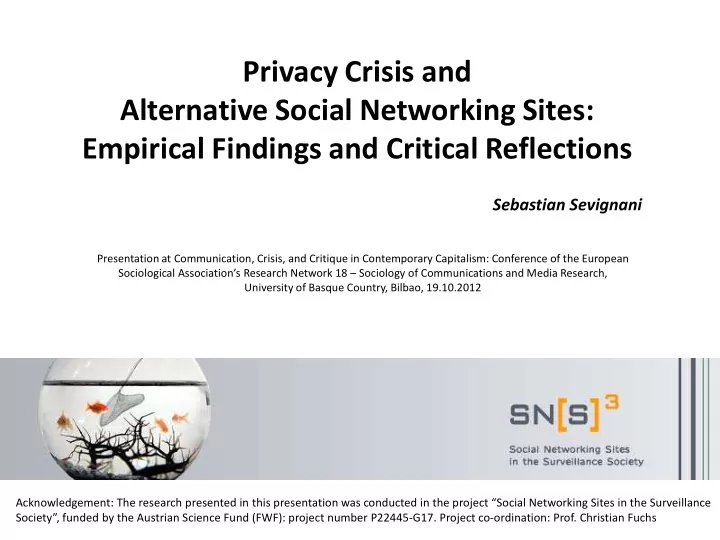

Privacy Crisis and Alternative Social Networking Sites: Empirical Findings and Critical Reflections Sebastian Sevignani Presentation at Communication, Crisis, and Critique in Contemporary Capitalism: Conference of the European Sociological Association’s Research Network 18 – Sociology of Communications and Media Research, University of Basque Country, Bilbao, 19.10.2012 Acknowledgement: The research presented in this presentation was conducted in the project “Social Networking Sites in the Surveillance Society”, funded by the Austrian Science Fund (FWF): project number P22445-G17. Project co-ordination: Prof. Christian Fuchs
overall aims of the presentation: applying an critical political-economy approach to the study of SNS presenting findings from a qualitative internet study contributing to the field of critical Internet studies supporting the need for alternative SNS, non- commercial SNS empirically
critical theory perspective on surveillance based business model of SNS and privacy crisis exploitation user surveillance targeted profit orientation Facebook PRIVACY CRISIS advertising G-W-G’ employee: “we funding store literally everything” alienation users’ tend to reframe these issues in individual terms: privacy discourse = loss of individual control over the access to personal data
research questions How is targeted advertising perceived by interviewees? In their view, is it a privacy issue? What do interviewees think about alternative SNS? Are they supportive? What challenges do they see for them?
applied methods purposive/conceptually driven sampling: cases that are (un-)critical as well as the standard user semi-structured interviewing (N=30) content analysis informed by thematic coding
In the view of SNS users, is targeted advertising a privacy issue? Not all users who disagree with advertising refer to the privacy discourse. Other critical arguments are: Negative consequences: from manipulation to annoyance and deflection. No positive consequences: waste of time Contradicts the genuine goal of social networks No alternative funding model The distribution if targeted advertising is or is not a privacy invasion was nearly balanced among our interviewees. A significant number of interviewees changed their attitudes after an information input about which categories of data Facebook is allowed to use and see it now as a privacy invasion.
In the view of SNS users, is targeted advertising a privacy issue? privacy invasion No informed consent: confusing/complex privacy settings do not apply to advertising Too excessively and disproportionally performed (e.g. usage of data on other sites than the genuine SNS) The SNS itself invades privacy Indirect consequences when personal data is accessed by others, e.g. hackers or the state Uncertainty what happens and will happen with the collected data “That is a kind of distortion. They say that they pass it away anonymously, but it comes back to me [...]. When it comes back to me with the advertisement that is targeted to me, then that is not anonymous.” (interviewee 23) “Nevertheless I am bothered by advertisements and the feeling is conveyed as if they know all about me.” (interviewee 30)
further manifestations of users’ need for alternative SNS lack of knowledge; dependency on SNS, one cannot waive it even heteronomy in trade- one feels uncomfortable; feeling of powerlessness; lack of offs betwenn privacy alternatives; fatalism (nothing is free in life, the current situation concerns and user benefits is non changeable) The overwhelming majority does support the introduction of opt- call for an opt-in in for advertising and would even welcome a law which makes opprtunity opt-in for advertising mandatory (26 interviewees).
Alternative SNS: Diaspora “Our distributed design means no big corporation will ever control Diaspora . Diaspora will never sell your peer-production social life to advertisers , and free software: copy you won’t have to conform to left someone’s arbitrary rules or look over your shoulder before distributed design you speak” (Diaspora 2011c).
Users’ attitudes towards alternative SNS A potential public funding model for SNS gains least support in comparison to traditional pay per use, and donation funding: concrete instances of alternative SNS can alter users’ willingness to welcome a donation funding model for SNS All interviewees support alternative SNS: real network idea; no abuse of personal data and potential state surveillance; non-commercial, free of advertising and therefore do not need centralised power architecture; enable participation, self-organisation, and self-determination (more) effectively; pluralism Two forms of support: ideally and monetarily
conclusion There is a need for alternative SNS among users Most of the users plead for an opt-in opportunity in the context of advertising on SNS and most of them even want a mandatory introduction of it All of our interviewed users welcome alternative SNS, most of them would even support them monetarily Critical theories of exploitation and alienation on SNS have empirical evidence.
Recommend
More recommend